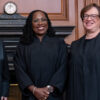Pay much attention to the same-sex marriage debate and you’re likely to hear how people who support marriage as one man and one woman are trying to impose their religious beliefs on other people. Dig in a bit deeper and you’ll find that many proponents of same-sex marriage aren’t very comfortable with political action by religious people and groups to support marriage as one man and one woman.
When Proposition 8 passed in California, for example, Mormons were widely criticized and even targeted for reprisals based on the widespread belief that the Mormon Church and many of its members had involved themselves in pro-marriage politics. One same-sex marriage activist has gone so far as to say that his “goal” is to get Mormons “out of the same-sex marriage business” and “back to helping hurricane victims.”
Turns out, however, that not all same-sex marriage proponents have a problem with religious influence in same-sex marriage politics.
Yesterday a group called Marriage Equality New York published a blog post titled “Faith Leaders from Across New York Issue Statement in Support of Marriage Equality.” According to the statement, its “Signatories Join 734 Additional New York State Clergy and Lay Leaders in Urging Lawmakers to Pass Marriage Legislation.”
The statement includes an explicit appeal to religious teachings: “Our faith traditions teach us that all people are children of God, deserving of love, dignity and equal treatment, and we, the undersigned therefore believe that gay and lesbian New Yorkers in committed, loving relationships should be able to protect each other with the critical safety-net provided by civil marriage” (emphasis added).
The statement also includes an explicit call for political action: “We call on the Legislature to pass this legislation for the good of these couples and for the good of our great State” (emphasis added).
This crystal clear example of mixing religion with politics to support same-sex marriage is not without precedent, as this Heritage backgrounder documents.
It would be easy to simply disregard such religious calls to political arms as underexposed examples of hypocrisy in the same-sex marriage movement. But the better response is to view such religiously inspired political actions as teachable moments in the marriage debate.
Let’s start with three points.
First, although some same-sex marriage proponents might believe that “religion is the chief obstacle for gay and lesbian political progress,” support for marriage as one man and one woman does not require belief in the religious teachings of any particular faith. Reasons to support marriage as one man and one woman include, for example, the public interest in strengthening bonds between husbands and wives and their children, the public interest in creating conditions that make it more likely that children will be born into intact families and raised by both biological parents, and the right and duty of free citizens to make laws that reflect natural human realities.
In this vein, the Ruth Institute has published a pamphlet setting forth “77 Non-Religious Reasons for Man/Woman Marriage.” This important resource provides compelling evidence that people can and do support marriage as one man and one woman for non-religious reasons.
Second, it’s perfectly fine for religious individuals and groups to get involved in politics and to bring religiously inspired moral perspectives to bear on public policy issues. As Barack Obama said in 2006, before he was President:
Secularists are wrong when they ask believers to leave their religion at the door before entering into the public square. Frederick Douglass, Abraham Lincoln, William Jennings Bryan, Dorothy Day, Martin Luther King—indeed, the majority of great reformers in American history—were not only motivated by faith but repeatedly used religious language to argue for their cause. To say that men and women should not inject their “personal morality” into public policy debates is a practical absurdity. Our law is by definition a codification of morality, much of it grounded in the Judeo-Christian tradition.
Advocates on both sides of the marriage debate should respect the reasoned participation in that debate of people of all faiths and no faith at all. The statement issued by clergy who support same-sex marriage in New York is a reminder of this important principle.
Third, although it is not necessary to appeal to distinctly religious authorities to resolve the marriage debate, there is no escaping the reality that the marriage debate presents inescapable moral considerations. As President Obama said in 2006, “Our law is by definition a codification of morality,” and as the U.S. Supreme Court stated long ago, marriage has “more to do with the morals and civilization of a people than any other institution.”
Many proponents of same-sex marriage might dispute the role that moral reasoning should play in the marriage debate, but an increasing number of same-sex marriage proponents now recognize that moral questions are a key component of the debate. Instead of avoiding these questions, the American public should consider them directly, and courts should afford proper deference to the moral conclusions that free citizens reach on this issue.



























